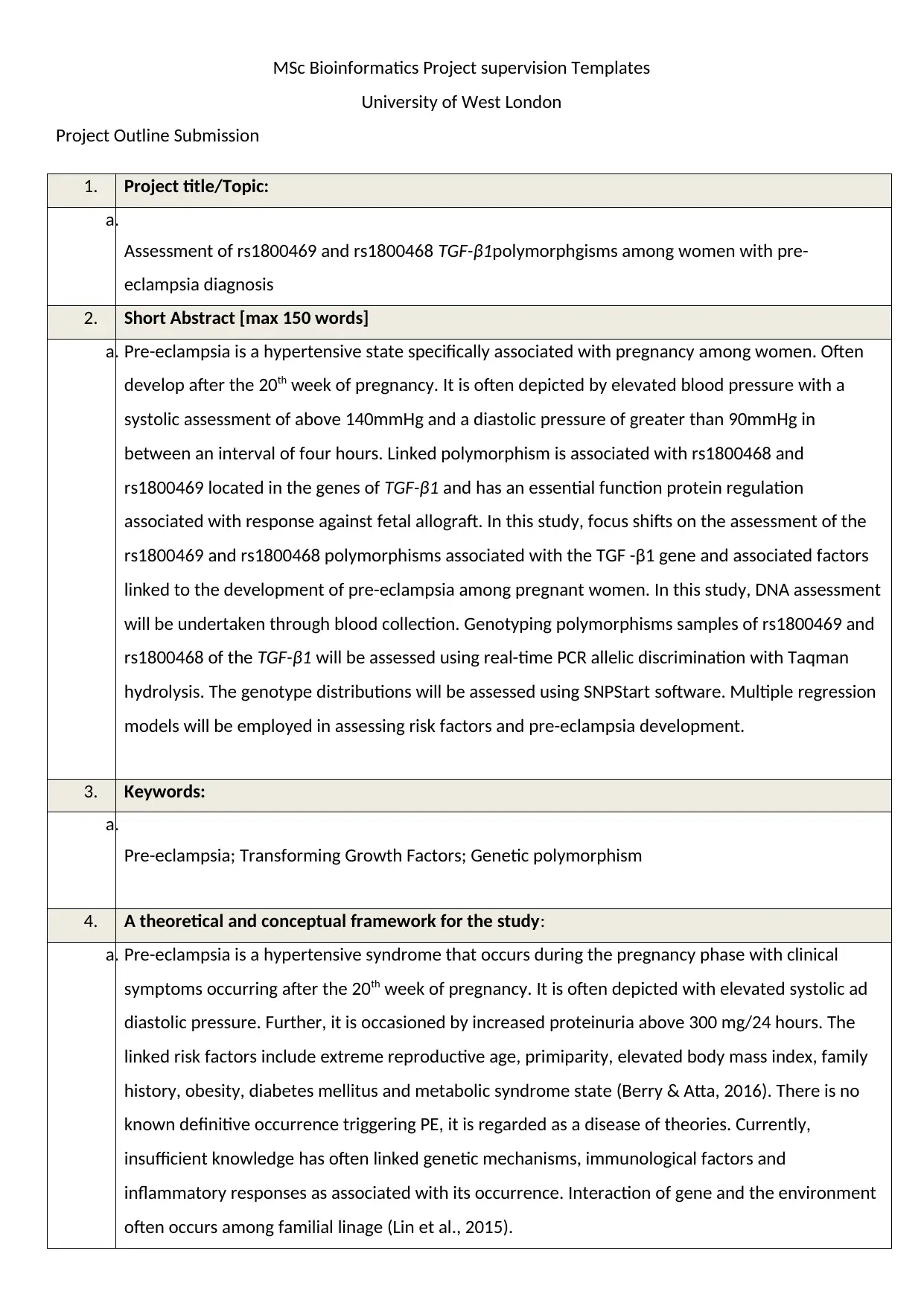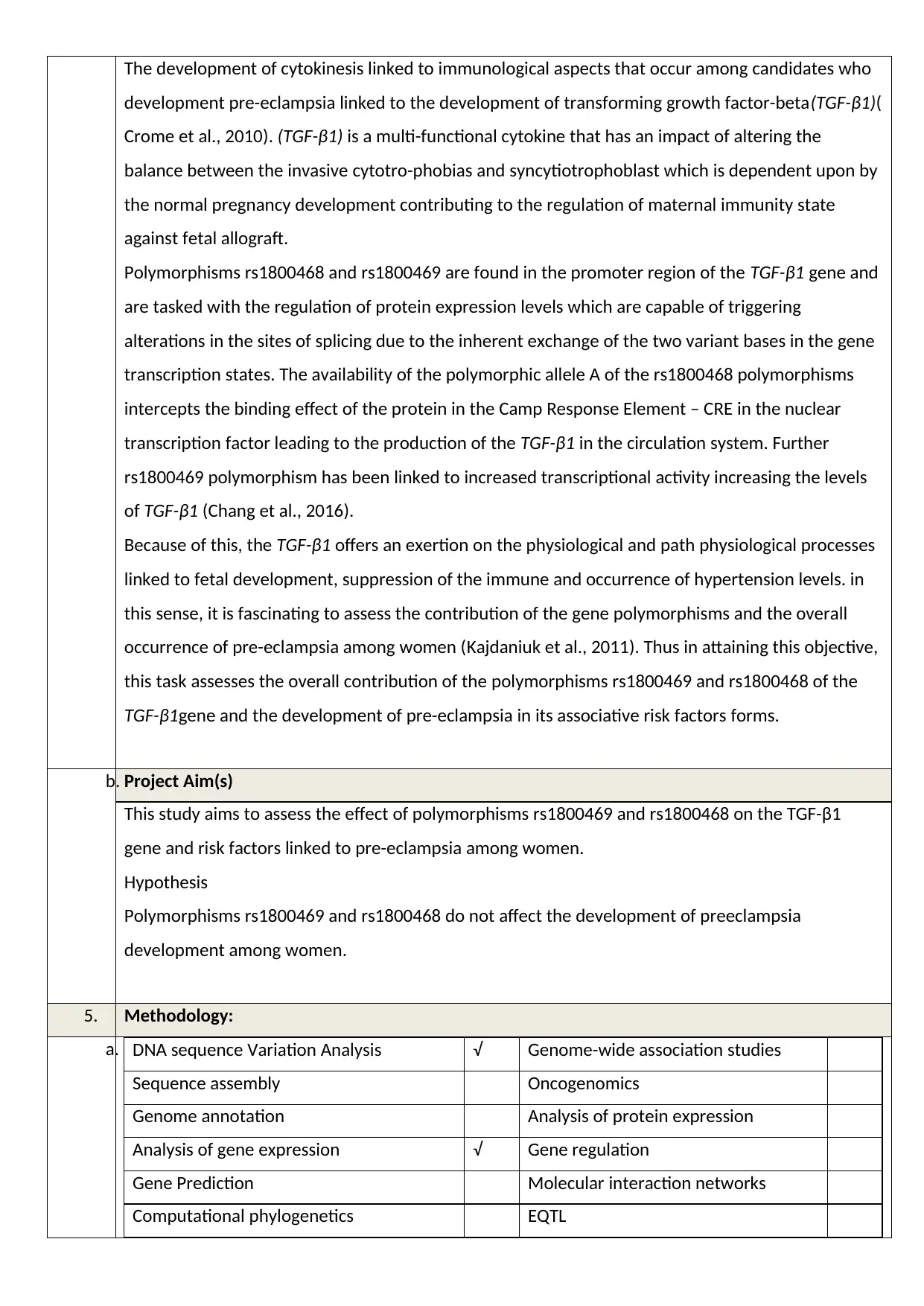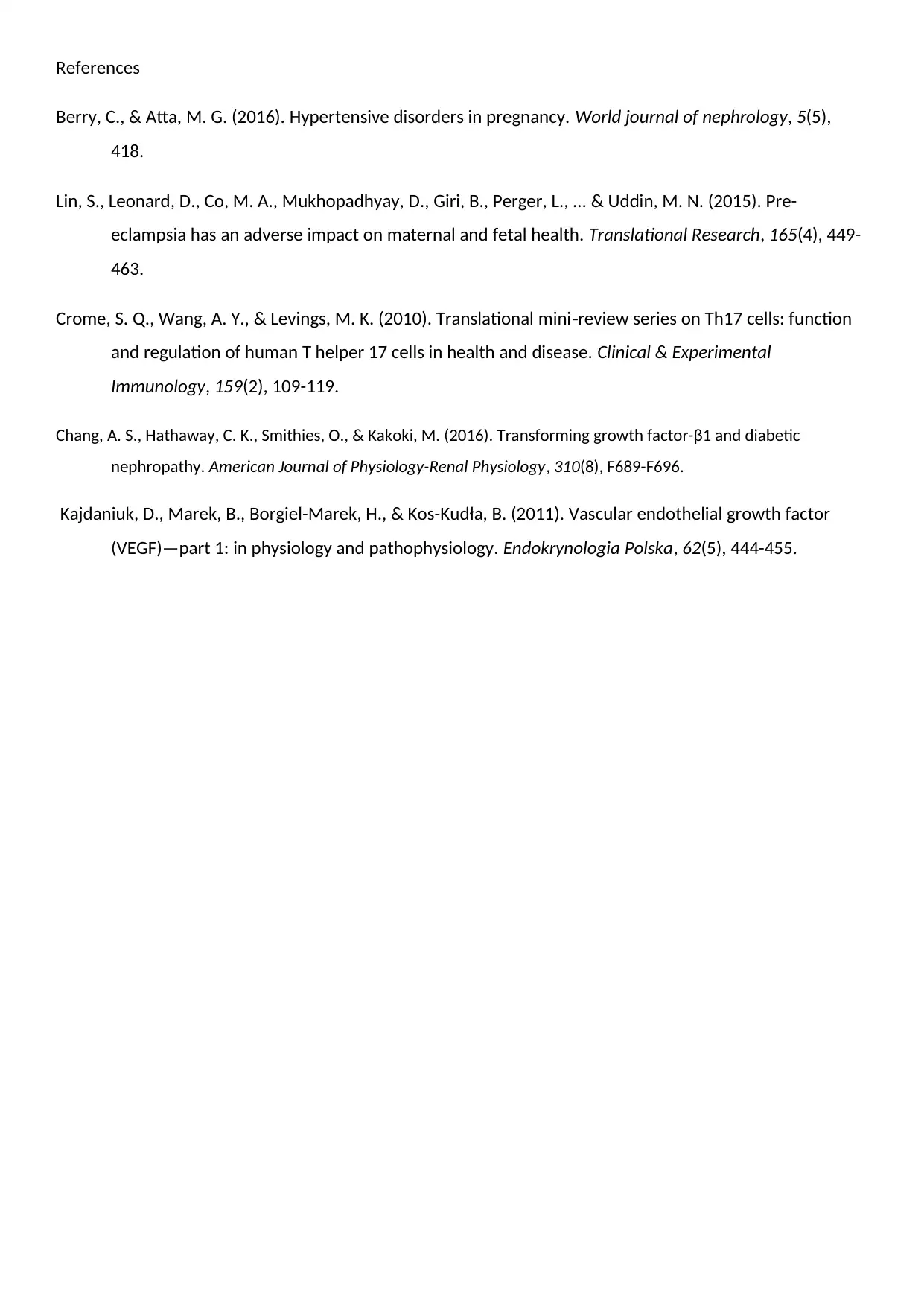TGF-1 polymorphisms among women with pre-eclampsia diagnosis
VerifiedAdded on 2022/08/11
|4
|994
|11
AI Summary
MSc Bioinformatics Project supervision Templates University of West London Project Outline Submission Project title/Topic: Assessment of rs1800469 and rs1800468 TGF-1polymorphgisms among women with pre-eclampsia diagnosis Short Element Abstract [max 150 words] Pre-eclampsia is a hypertensive state specifically associated with pregnancy among women. In this study, focus shifts on the assessment of the rs1800469 and rs1800468 polymorphisms associated with the TGF -
Contribute Materials
Your contribution can guide someone’s learning journey. Share your
documents today.

MSc Bioinformatics Project supervision Templates
University of West London
Project Outline Submission
1. Project title/Topic:
a.
Assessment of rs1800469 and rs1800468 TGF-β1polymorphgisms among women with pre-
eclampsia diagnosis
2. Short Abstract [max 150 words]
a. Pre-eclampsia is a hypertensive state specifically associated with pregnancy among women. Often
develop after the 20th week of pregnancy. It is often depicted by elevated blood pressure with a
systolic assessment of above 140mmHg and a diastolic pressure of greater than 90mmHg in
between an interval of four hours. Linked polymorphism is associated with rs1800468 and
rs1800469 located in the genes of TGF-β1 and has an essential function protein regulation
associated with response against fetal allograft. In this study, focus shifts on the assessment of the
rs1800469 and rs1800468 polymorphisms associated with the TGF -β1 gene and associated factors
linked to the development of pre-eclampsia among pregnant women. In this study, DNA assessment
will be undertaken through blood collection. Genotyping polymorphisms samples of rs1800469 and
rs1800468 of the TGF-β1 will be assessed using real-time PCR allelic discrimination with Taqman
hydrolysis. The genotype distributions will be assessed using SNPStart software. Multiple regression
models will be employed in assessing risk factors and pre-eclampsia development.
3. Keywords:
a.
Pre-eclampsia; Transforming Growth Factors; Genetic polymorphism
4. A theoretical and conceptual framework for the study:
a. Pre-eclampsia is a hypertensive syndrome that occurs during the pregnancy phase with clinical
symptoms occurring after the 20th week of pregnancy. It is often depicted with elevated systolic ad
diastolic pressure. Further, it is occasioned by increased proteinuria above 300 mg/24 hours. The
linked risk factors include extreme reproductive age, primiparity, elevated body mass index, family
history, obesity, diabetes mellitus and metabolic syndrome state (Berry & Atta, 2016). There is no
known definitive occurrence triggering PE, it is regarded as a disease of theories. Currently,
insufficient knowledge has often linked genetic mechanisms, immunological factors and
inflammatory responses as associated with its occurrence. Interaction of gene and the environment
often occurs among familial linage (Lin et al., 2015).
University of West London
Project Outline Submission
1. Project title/Topic:
a.
Assessment of rs1800469 and rs1800468 TGF-β1polymorphgisms among women with pre-
eclampsia diagnosis
2. Short Abstract [max 150 words]
a. Pre-eclampsia is a hypertensive state specifically associated with pregnancy among women. Often
develop after the 20th week of pregnancy. It is often depicted by elevated blood pressure with a
systolic assessment of above 140mmHg and a diastolic pressure of greater than 90mmHg in
between an interval of four hours. Linked polymorphism is associated with rs1800468 and
rs1800469 located in the genes of TGF-β1 and has an essential function protein regulation
associated with response against fetal allograft. In this study, focus shifts on the assessment of the
rs1800469 and rs1800468 polymorphisms associated with the TGF -β1 gene and associated factors
linked to the development of pre-eclampsia among pregnant women. In this study, DNA assessment
will be undertaken through blood collection. Genotyping polymorphisms samples of rs1800469 and
rs1800468 of the TGF-β1 will be assessed using real-time PCR allelic discrimination with Taqman
hydrolysis. The genotype distributions will be assessed using SNPStart software. Multiple regression
models will be employed in assessing risk factors and pre-eclampsia development.
3. Keywords:
a.
Pre-eclampsia; Transforming Growth Factors; Genetic polymorphism
4. A theoretical and conceptual framework for the study:
a. Pre-eclampsia is a hypertensive syndrome that occurs during the pregnancy phase with clinical
symptoms occurring after the 20th week of pregnancy. It is often depicted with elevated systolic ad
diastolic pressure. Further, it is occasioned by increased proteinuria above 300 mg/24 hours. The
linked risk factors include extreme reproductive age, primiparity, elevated body mass index, family
history, obesity, diabetes mellitus and metabolic syndrome state (Berry & Atta, 2016). There is no
known definitive occurrence triggering PE, it is regarded as a disease of theories. Currently,
insufficient knowledge has often linked genetic mechanisms, immunological factors and
inflammatory responses as associated with its occurrence. Interaction of gene and the environment
often occurs among familial linage (Lin et al., 2015).
Secure Best Marks with AI Grader
Need help grading? Try our AI Grader for instant feedback on your assignments.

The development of cytokinesis linked to immunological aspects that occur among candidates who
development pre-eclampsia linked to the development of transforming growth factor-beta(TGF-β1)(
Crome et al., 2010). (TGF-β1) is a multi-functional cytokine that has an impact of altering the
balance between the invasive cytotro-phobias and syncytiotrophoblast which is dependent upon by
the normal pregnancy development contributing to the regulation of maternal immunity state
against fetal allograft.
Polymorphisms rs1800468 and rs1800469 are found in the promoter region of the TGF-β1 gene and
are tasked with the regulation of protein expression levels which are capable of triggering
alterations in the sites of splicing due to the inherent exchange of the two variant bases in the gene
transcription states. The availability of the polymorphic allele A of the rs1800468 polymorphisms
intercepts the binding effect of the protein in the Camp Response Element – CRE in the nuclear
transcription factor leading to the production of the TGF-β1 in the circulation system. Further
rs1800469 polymorphism has been linked to increased transcriptional activity increasing the levels
of TGF-β1 (Chang et al., 2016).
Because of this, the TGF-β1 offers an exertion on the physiological and path physiological processes
linked to fetal development, suppression of the immune and occurrence of hypertension levels. in
this sense, it is fascinating to assess the contribution of the gene polymorphisms and the overall
occurrence of pre-eclampsia among women (Kajdaniuk et al., 2011). Thus in attaining this objective,
this task assesses the overall contribution of the polymorphisms rs1800469 and rs1800468 of the
TGF-β1gene and the development of pre-eclampsia in its associative risk factors forms.
b. Project Aim(s)
This study aims to assess the effect of polymorphisms rs1800469 and rs1800468 on the TGF-β1
gene and risk factors linked to pre-eclampsia among women.
Hypothesis
Polymorphisms rs1800469 and rs1800468 do not affect the development of preeclampsia
development among women.
5. Methodology:
a. DNA sequence Variation Analysis √ Genome-wide association studies
Sequence assembly Oncogenomics
Genome annotation Analysis of protein expression
Analysis of gene expression √ Gene regulation
Gene Prediction Molecular interaction networks
Computational phylogenetics EQTL
development pre-eclampsia linked to the development of transforming growth factor-beta(TGF-β1)(
Crome et al., 2010). (TGF-β1) is a multi-functional cytokine that has an impact of altering the
balance between the invasive cytotro-phobias and syncytiotrophoblast which is dependent upon by
the normal pregnancy development contributing to the regulation of maternal immunity state
against fetal allograft.
Polymorphisms rs1800468 and rs1800469 are found in the promoter region of the TGF-β1 gene and
are tasked with the regulation of protein expression levels which are capable of triggering
alterations in the sites of splicing due to the inherent exchange of the two variant bases in the gene
transcription states. The availability of the polymorphic allele A of the rs1800468 polymorphisms
intercepts the binding effect of the protein in the Camp Response Element – CRE in the nuclear
transcription factor leading to the production of the TGF-β1 in the circulation system. Further
rs1800469 polymorphism has been linked to increased transcriptional activity increasing the levels
of TGF-β1 (Chang et al., 2016).
Because of this, the TGF-β1 offers an exertion on the physiological and path physiological processes
linked to fetal development, suppression of the immune and occurrence of hypertension levels. in
this sense, it is fascinating to assess the contribution of the gene polymorphisms and the overall
occurrence of pre-eclampsia among women (Kajdaniuk et al., 2011). Thus in attaining this objective,
this task assesses the overall contribution of the polymorphisms rs1800469 and rs1800468 of the
TGF-β1gene and the development of pre-eclampsia in its associative risk factors forms.
b. Project Aim(s)
This study aims to assess the effect of polymorphisms rs1800469 and rs1800468 on the TGF-β1
gene and risk factors linked to pre-eclampsia among women.
Hypothesis
Polymorphisms rs1800469 and rs1800468 do not affect the development of preeclampsia
development among women.
5. Methodology:
a. DNA sequence Variation Analysis √ Genome-wide association studies
Sequence assembly Oncogenomics
Genome annotation Analysis of protein expression
Analysis of gene expression √ Gene regulation
Gene Prediction Molecular interaction networks
Computational phylogenetics EQTL

Comparative genomics √ Computational Modelling
Pan genomics Epigenetics
Other (describe):
6. Analysis Methods:
a.
- SNPStat software
- Chi-square test to test whether the genotypic distributions
- Real-time PCR allelic discrimination with TaqMan® hydrolysis probes
7. Schedule:
a.
Pan genomics Epigenetics
Other (describe):
6. Analysis Methods:
a.
- SNPStat software
- Chi-square test to test whether the genotypic distributions
- Real-time PCR allelic discrimination with TaqMan® hydrolysis probes
7. Schedule:
a.

References
Berry, C., & Atta, M. G. (2016). Hypertensive disorders in pregnancy. World journal of nephrology, 5(5),
418.
Lin, S., Leonard, D., Co, M. A., Mukhopadhyay, D., Giri, B., Perger, L., ... & Uddin, M. N. (2015). Pre-
eclampsia has an adverse impact on maternal and fetal health. Translational Research, 165(4), 449-
463.
Crome, S. Q., Wang, A. Y., & Levings, M. K. (2010). Translational mini review series on Th17 cells: function‐
and regulation of human T helper 17 cells in health and disease. Clinical & Experimental
Immunology, 159(2), 109-119.
Chang, A. S., Hathaway, C. K., Smithies, O., & Kakoki, M. (2016). Transforming growth factor-β1 and diabetic
nephropathy. American Journal of Physiology-Renal Physiology, 310(8), F689-F696.
Kajdaniuk, D., Marek, B., Borgiel-Marek, H., & Kos-Kudła, B. (2011). Vascular endothelial growth factor
(VEGF)—part 1: in physiology and pathophysiology. Endokrynologia Polska, 62(5), 444-455.
Berry, C., & Atta, M. G. (2016). Hypertensive disorders in pregnancy. World journal of nephrology, 5(5),
418.
Lin, S., Leonard, D., Co, M. A., Mukhopadhyay, D., Giri, B., Perger, L., ... & Uddin, M. N. (2015). Pre-
eclampsia has an adverse impact on maternal and fetal health. Translational Research, 165(4), 449-
463.
Crome, S. Q., Wang, A. Y., & Levings, M. K. (2010). Translational mini review series on Th17 cells: function‐
and regulation of human T helper 17 cells in health and disease. Clinical & Experimental
Immunology, 159(2), 109-119.
Chang, A. S., Hathaway, C. K., Smithies, O., & Kakoki, M. (2016). Transforming growth factor-β1 and diabetic
nephropathy. American Journal of Physiology-Renal Physiology, 310(8), F689-F696.
Kajdaniuk, D., Marek, B., Borgiel-Marek, H., & Kos-Kudła, B. (2011). Vascular endothelial growth factor
(VEGF)—part 1: in physiology and pathophysiology. Endokrynologia Polska, 62(5), 444-455.
1 out of 4
Your All-in-One AI-Powered Toolkit for Academic Success.
+13062052269
info@desklib.com
Available 24*7 on WhatsApp / Email
![[object Object]](/_next/static/media/star-bottom.7253800d.svg)
Unlock your academic potential
© 2024 | Zucol Services PVT LTD | All rights reserved.